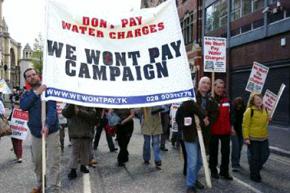Why should we celebrate difference?
, a socialist and journalist in Northern Ireland, explains how a united fight against water charges could bring Catholic and Protestant workers together.
A FRIEND of mine recently attended a seminar at which a community relations expert explained that Catholics/nationalists should acquaint themselves with the history of the Orange Order, the better to learn to respect the culture which the Order embodied.
"I'm a Protestant," she spoke up, "and I have no time for the Orange Order." When the frisson had faded, she was advised to "do some single identity work."
You are a Prod. Get with the program.
At a conference on "Building Peace" in the Europa last year, a man who served time for sectarian murder and a former paramilitary leader from "the other side" stood together at the microphone explaining that, a few years ago, they wouldn't have been speaking together, but trying to kill one another.
Cue amiable laughter and applause. Each added that he hadn't budged an inch from the ideas that his armed actions had been designed to advance. Better than killing one another, right enough. But a recipe for a stable society at ease with itself?
The defining mantra of such events is "celebrating difference"--as if the way the Catholic and Protestant communities have related to one another is the problem. Which lets British governments off the hook, validates political parties based on communal identity and stiffens the sense of separateness.

Moreover, if the problem stems solely or mainly from Protestants and Catholics not getting along, the solution must lie in "the two communities" finding a modus vivendi. If you fail or refuse to fit into this pattern of political allegiance, you can have no direct role in this enterprise.
You might arbitrate, perhaps, even act as referee, but you aren't eligible to play in the game. The rules of the game, as codified in the Good Friday Agreement, require each side to turn out in its own colors and to respect the colors of the opposing team.
So Assembly members who disrupt the pattern by defining themselves as "other" are given short shrift. Their existence is mentioned in paragraph six of the Strand One section of the Agreement: "At their first meeting, members of the Assembly will register a designation of identity--nationalist, unionist or other--for the purposes of measuring cross-community support in Assembly votes." And that's it.
"Others" then disappear from the text. Which is logical enough. What function could they possibly fill in measuring "cross-community support"? The permanency of politics based on the religious division is taken for granted.
BALANCE THEN requires that the bulk of the blame for what we have gone through isn't ascribed to one community or the other--or to armed groups claiming to represent one community or other.
History is depicted as a battlefield from which no clear winner can emerge. Whataboutery is the first official language of this discourse.
Inevitably, the ideas that most clearly reflect separate identities are endorsed as the naturally dominant and effectively unchallengeable ideas in politics. And in the absence of any material underpinning of this separation, "culture" comes to the fore. It no longer raises eyebrows to hear Orange Order marches presented as a core element of "the culture of the Protestant community." So to denounce a plan to parade 41 Orange bands through Rasharkin is to disrespect the culture of the Protestant people.
If a balancing example is required, consider the spokesman for a nationalist party associated with a paramilitary group who defended the controversial erection of a monument to a comrade "killed in action" as "part of the culture of the indigenous population."
Celebrate such differences? Well, maybe, if we must. But ought we not also celebrate sameness? It's likely there will be another attempt before the end of the year to force us to pay water charges. Only a mass non-payment campaign has a potential to see the threat off--a campaign that would, of practical necessity, mobilize people on a basis that has nothing to do with the community they come from.
The fight cannot be won on the Shankill if it isn't also won on the Falls. The shared sense of achievement which would be generated by a victory for a campaign structured along these lines would do more to demolish sectarian barriers than a thousand gatherings at which every person present would have to be acutely aware of which community they "belonged" to.
It has ever been thus. The only occasions in our history when sizeable numbers of Catholics and Protestants have left religious identity behind and joined hands have been occasions when the point was to advance class interests.
This is not to say that sectarian rivalries would melt away automatically in the heat of common struggle. For as far ahead as it's possible to see, what history has bequeathed us will remain part of what we are. But it needn't be all or even most of what we are.
First published in the Belfast Telegraph.


